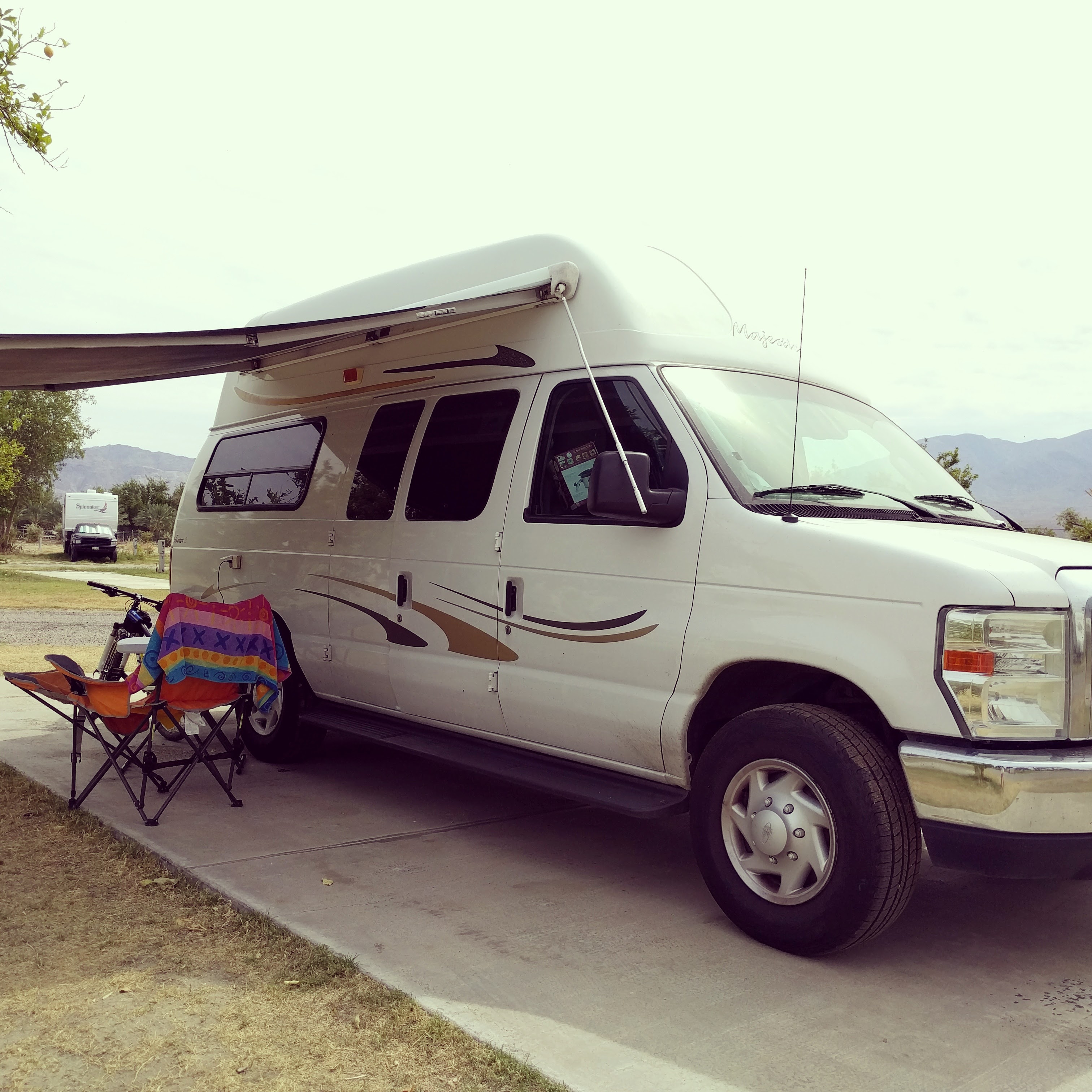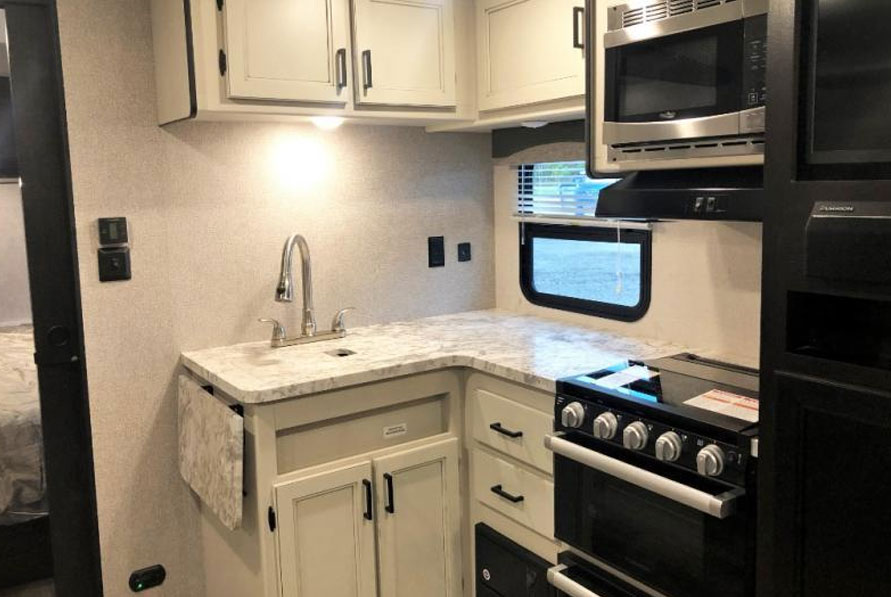 Living the RV life has become more than a pastime, it is a way of life for many in the Covid era. People are working remotely, packing up, and living out of their RVs. As exciting as this seems, there are challenges, so we put together these tips to give you some ideas to make your RV lifestyle as easy and fun as possible!
Living the RV life has become more than a pastime, it is a way of life for many in the Covid era. People are working remotely, packing up, and living out of their RVs. As exciting as this seems, there are challenges, so we put together these tips to give you some ideas to make your RV lifestyle as easy and fun as possible!
Looking For an RV
You have decided to buy an RV. One of the things you want to think about is the layout. You will be spending a lot of time there, so you want to be sure to find an RV that suits your lifestyle and your comfort. Here are some things you can look for to make your RV feel most like home:
- Bigger is not necessarily better it will be harder to navigate, and it will limit you. You won’t have an easy time getting into some campgrounds.
- You need to find an RV that has everything you will need for your new lifestyle, and have the space you need. You do not want to feel cramped.
- It is also preferred to have an RV with a slider. The slider makes a huge difference in space, they can enlarge the space.
Think about the things you must have and those you can live without. There is a good chance that after living in one, you will buy a new one that better fits your needs. I am on the third RV now. I keep going larger but still under 30 feet. At this point, I believe I found the perfect RV for myself. (Take a look at my current rig)
What About Power?
If you are living in an RV that is tied into the grid then you will have endless electricity. For those who are boondocking, you will need to have a power solution like a generator or solar power. If you don’t have a built-in generator, consider buying one and a battery charger to charge the battery faster and more efficiently. Invest in LED lights to reduce your power consumption if your RV is not already equipped with these. Remember that solar panels pay for themselves after a while, so look into some portable panels to save running the generator too much. If you need to set up your own solar system and you need help, get solar help.
What to Know About Water?
It is important to understand the different waters in your RV.
Fresh Water: Freshwater tanks vary in size and are used for showering, drinking water, making coffee, cooking, and doing dishes. If you have a well you can hook into that, but if you do not, it is important to make the most of the water in your tank. You can save freshwater by skipping the daily shower and having extra bladders to fill up your water tank.
Black Water: Blackwater is anything that comes down from the toilet. To better deal with black water, be mindful of the amount of toilet paper you use. I use a separate garbage can for the paper. e sure that your black water tank is actually emptying when you dump it and flush out the black water tank and toilet at the dump station.
Grey Water: This includes anything from the shower, bathroom sink, or kitchen sink. When you live in your RV full-time your greywater will fill up much more quickly than your black water. Use a paper towel to wipe off your dishes, then just rinse quickly, take navy showers, and if you can, use a bin to catch water from the sink and shower.
 Kitchen Tips
Kitchen Tips
RV counter spaces are really small. Keep meals simple. You should pick meals with relatively few ingredients. It is also a good idea to cook in bulk, prep vegetables in bulk, and put them in plastic containers in the fridge. Use a BBQ outside, this will extend your kitchen space.
If you love cooking and spending time in the kitchen, then it may be hard to live without your favorite appliances and dishes. Ideally, you want to keep the RV tidy and have as little in it as possible, which means giving up many of your favorite kitchen appliances. Have one set of dishes for each person and only include the things you use daily or weekly and have only what you absolutely need.
When living off-grid it’s a great idea to have some sort of food storage. Keep everything organized in bins and organize them by spices, cans, things you use daily, snack storage, and more. Save your storage space for food rather than things like clothing. If you prepare something often, have a lot of those ingredients on hand in storage.
Stay Clean and Organized
With space in an RV being limited, it is important to stay organized. This helps keep the place tidy and you can quickly find what you need. Try to put things in an intuitive place. Think about the flow of your lifestyle throughout the RV and make sure items you use daily are easily accessible, and in a convenient location.
Pack your clothes according to the season. If it’s winter, you don’t need tank tops, shorts, dresses, or anything of that sort. If you have the space or are living in your RV solo, you may be able to pack your seasonal clothing into bins under your bed or store it in harder-to-access spaces. Basically, if you don’t wear it, don’t make it accessible. Have a laundry bag that is easily accessible. If you have a separate car, you can use that for laundry.
Clean up as you go, which is extremely important when living in small spaces. Clean up dishes immediately after eating, put away clothes after wearing them, and put the laptops and chargers away so that they don’t add clutter.
Somehow, when you’re living in an RV, things get dirty quickly. You notice every detail when your home is small and too much dirt can make a place look unorganized and messy, so it is important to be clean. Sweep daily with a compact broom and frequently wipe down all surfaces with a towel. Have a small vac on board as well as a dirt-collecting doormat at the entrance to your RV.
Staying Comfortable
Where you sleep needs to be comfortable, to make sure you get good sleep. It also matters that the inside of your RV is a comfortable temperature, and this will vary according to the climate you are in. Turn the heater down at night so you don’t have to listen to the sound of the heater kicking on.
If it is hotter, run a fan at night to keep you cool, as well as provide some peaceful white noise. Buy a quality mattress, making sure to check the mattress dimensions in your RV. Make your bed daily to make the RV seem cleaner which will help keep you in a good mood.
 Staying Warm
Staying Warm
When you are boondocking in a colder climate, there are some things you can do to winterize your RV while you’re living in it. Use heat tape to wrap your hoses to prevent them from freezing. Insulate your carport with fiberglass and keep your heater at 50 degrees minimum which helps keep things from freezing.
Leave cupboards open that would normally hide things like plumbing and water tanks. You need all the heat you can get so be sure to leave all appropriate cupboards open so that the heat can infiltrate the area. Remember to air out your RV or you will have a lot of moisture accumulation. Finally, dress warmly to prevent freezing.
However, in my opinion, if there are freezing temperatures are out there, you are in the wrong place. If you are able to spend your winters in warmer climates, you are better off. Even then nights can be cool and your RV furnace is not too efficient. Get a small, more economical heater that can help to keep you warm. If you are plugged in, a small electric heater, if you are boondocking, you will need a propane heater.
Additional Tips to Consider
If you are planning on living in your camper RV long-term, then you need to maintain it. Cleaning the roofs at least twice a year, maintain the slides, keeping them lubricated, cover your tires from sun damage, blow the dust out of the fridge and heater vents, etc. Dry rot and leaks are also common.
If you are stationary, you can get a carport to keep your RV more protected from the elements.
The post The Ultimate Guide to RV Living appeared first on Small RV Lifestyle.
